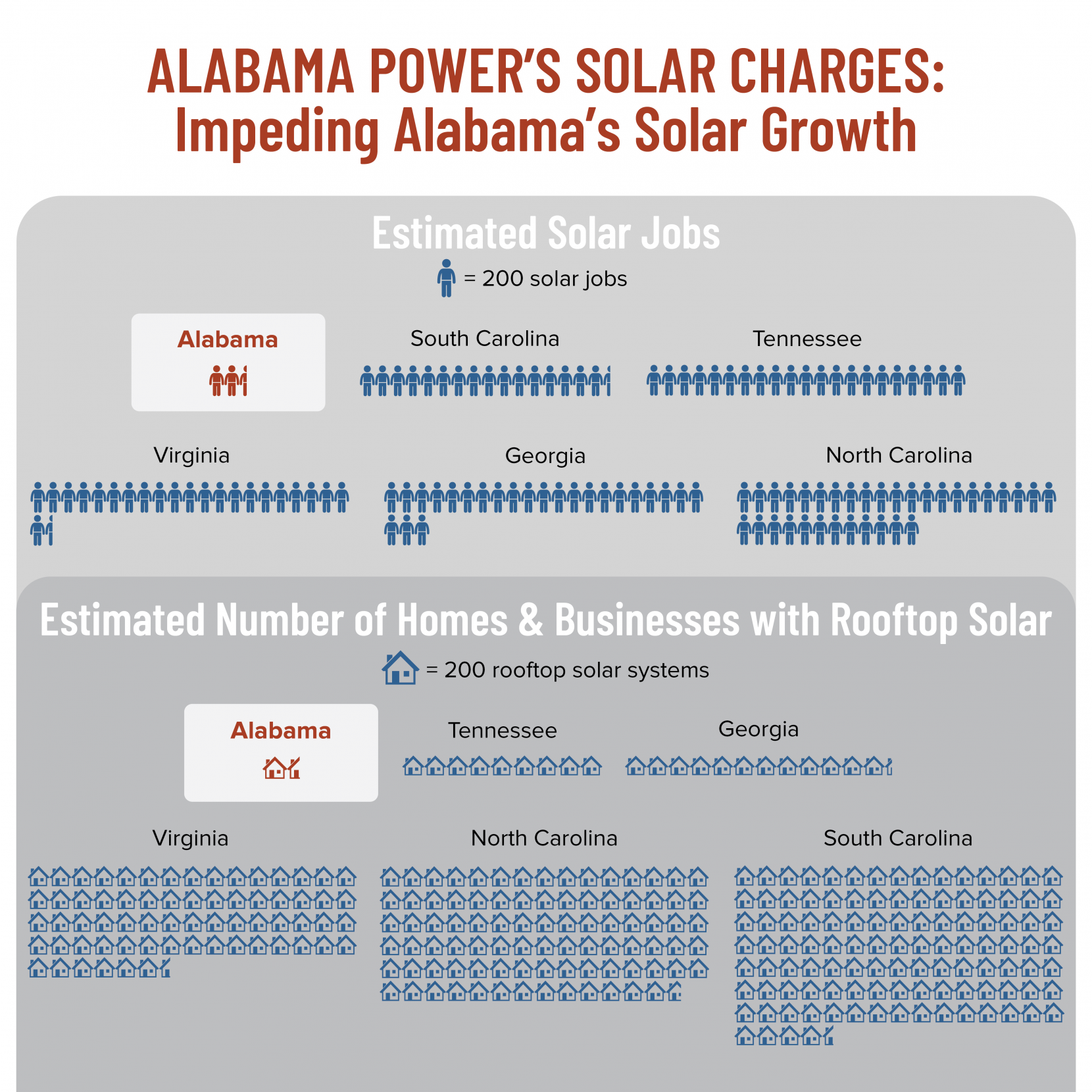We’re representing Alabamians subjected to unjust solar charges
The Alabama Public Service Commission violated federal law by approving Alabama Power’s punitive charges against customers with on-site solar. That’s what customers and conservation groups are alleging in their federal petition filed this week.
SELC and Ragsdale LLC are asking the Federal Energy Regulatory Commission (FERC) to exercise its authority to enforce federal protections for homeowners, businesses, and schools that chose solar energy by implementing the Public Utility Regulatory Policies Act (PURPA), which protects solar customers from unfair treatment by their utility.

“Alabama Power’s monthly fee makes it extremely difficult for people like me who want to install solar to lower their monthly bills and generate clean energy,” says TK Thorne, a Birmingham-area resident and Alabama Power solar customer subject to the charges. “Alabamians should be free to make energy decisions on their own properties, without unjust interference from a monopoly trying to preserve its own profits.”
PURPA requires state regulatory commissions to observe certain minimum federal protections, including that utilities cannot sell power at a discriminatory rate to customers who adopt renewable energy technologies, such as solar power, to meet some of their energy needs.
The petition was filed with FERC on behalf of four Alabama Power customers who invested in solar installations on their properties and GASP, a Birmingham-based nonprofit that works to remove obstacles to solar deployment in Alabama. It specifically asks FERC to initiate an enforcement action against the Alabama Public Service Commission, which has oversight of Alabama Power and allowed the fee.
“By imposing one of the highest fees of any regulated utility nationwide on solar customers, Alabama Power’s unjustified solar charge is severely curtailing renewable energy development in our state, and other states are leaving Alabama behind because of it,” says Keith Johnston, director of SELC’s Alabama office.
Since its adoption in 2013, Alabama Power’s monthly fee has limited the rights of Alabama homeowners, businesses, and schools to use solar power to reduce their electric bills. The monthly fee is added on top of other fixed and variable charges and significantly reduces customers’ expected savings. For example, a typical residential customer with a 5 kilowatt solar array must pay an additional $324 per year, or more than $9,700 over 30 years, the lifetime of a typical system.
Alabama Power’s monthly fee makes it extremely difficult for people like me who want to install solar to lower their monthly bills and generate clean energy. Alabamians should be free to make energy decisions on their own properties, without unjust interference from a monopoly trying to preserve its own profits.
TK Thorne, Alabama Power customer
The FERC petition follows a complaint filed by the same groups in April 2018, which asked the Alabama Public Service Commission to determine that Alabama Power’s rate treatment of solar customers is unfair, contrary to public interest, and otherwise unlawful.
The PSC issued an order in October 2020 granting the utility’s motion to dismiss the groups’ original complaint and approving its proposal to increase the existing monthly charge from $5 per kilowatt, based on the size of the customer’s solar system, to $5.41 per kilowatt.
As a result of Alabama Power’s charges and other policy roadblocks, Alabama has only a fraction of the solar capacity found in other Southern states. Despite its abundance of sunshine, Alabama has only about 300 small-scale solar customers compared to 2,435 in Georgia, 17,767 in North Carolina, and 21,883 in South Carolina, according to data filed with the Energy Information Administration.
A number of other states have rejected these types of charges as unjustified and discriminatory. In 2013 Alabama Power’s sister utility Georgia Power proposed a similar charge but withdrew it in the face of overwhelming bipartisan opposition.
In 2018, the New Mexico Public Regulation Commission struck down a similar charge. More recently, the Kansas Supreme Court rejected a similar solar charge as discriminatory in an April 2020 ruling, which the Alabama PSC was made aware of ahead of its decision.
“In addition to creating road blocks for families and businesses that want to go solar, Alabama Power and the Public Service Commission are holding our state back from the economic growth and job creation we’ve seen from solar deployment across the South,” says GASP Executive Director Michael Hansen. “Alabama families pay some of the highest monthly energy bills in the country—it is wrong for a utility to benefit financially from limiting customers’ options.”
